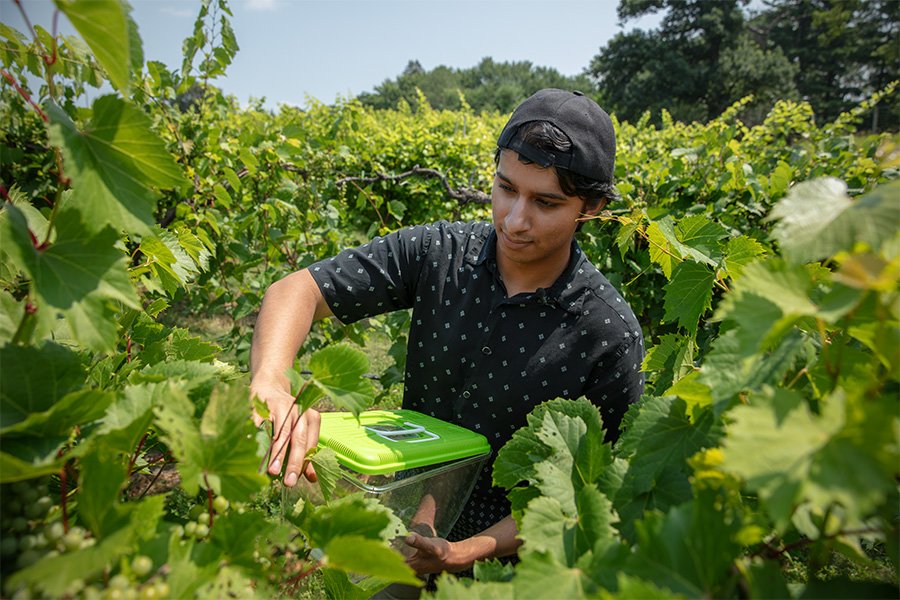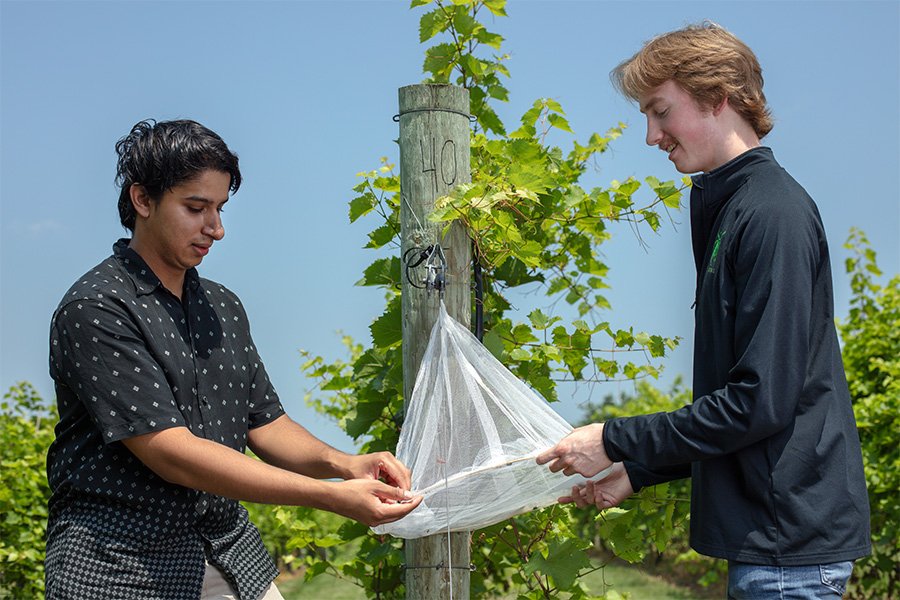Start-up company aims to eliminate Japanese beetles with eco-friendly solution

MINNEAPOLIS / ST. PAUL (09/09/2024) — A start-up company co-founded by Aditya Prabhbu while he was a University of Minnesota College of Science and Engineering undergraduate student aims to attract and eliminate Japanese Beetles in large quantities with a new method that is environmentally safe.
Japanese beetles are invasive insects that impact many farmers and gardeners across the country. The beetles can wreak havoc on more than 300 plant species, from soybeans to rose bushes. According to the U.S. Department of Agriculture, efforts to control the larval and adult stages are estimated to cost more than $460 million a year.
Right now, the primary way to manage and eliminate them is through harmful pesticides that kill pollinators and sterilize the environment. Current non-toxic solutions on the market include bug bait traps that use a pheromone, a chemical scent produced by animals, to attract and catch beetles. These traps can pull beetles away from the impacted plants and catch them within a container. An issue with this solution is how quickly these traps fill up during the season, requiring frequent dumping and refilling. In some cases, they may overfill and the beetles could escape back into the environment.
This problem hits close to home for Prabhu, as the orchard trees in his yard would be stripped clean by the beetles. Outside of harmful pesticides, the best solution for him was to hand pick them off of the plants. After long evenings spent hand picking the beetles, he decided it was time to find a better way.

The team at the start-up company, Alure, is testing ways to attract Japanese beetles and eliminate them in large quantities in a way that is safe for the environment. This strategy can be paired with a collector for monitoring and research applications.
Their solution is an infused netting technology. The broad surface mesh enclosure attracts Japanese Beetles using a pheromone-baited scent and exposes them to a low dose of insecticide once they have stepped onto the surface. When they are immobilized, they fall into the netting. This method, although deadly for the beetles, is safe for humans and animals. Their model is able to not only bait and catch the beetles, but also eliminate them.
“If the strategy works as expected, where we can not only pull away beetles from targeted plants, but kill them within a short period of time and at a fraction of the cost of insecticide sprays. This strategy would provide substantial benefits to growers and gardeners alike,” said Prabhu, who graduated in spring 2024 with a bachelor’s degree in computer engineering from the Department of Electrical and Computer Engineering. Prabhu is currently a Technology Development Program Associate for Ameriprise Financial Services.
So far, Prabhu and his colleagues have found a 90-second walking time on the mesh resulted in 100 percent mortality in the test group after 30 minutes. The team will continue testing as Japanese beetles continue to migrate into the Midwest. If positive results continue, the team is hoping a similar strategy could be applied to other pests and insects.
In April, Alure competed in the eFest2024 at the University of St. Thomas and received about $8,000 in corporate funding for the start-up. Alure won the 2024 Minnesota Cup student division and will be competing this fall for an opportunity to receive additional funding for their start-up company.
Prabhu was supported by several University scholarships during his time as an undergraduate student, including the CSE Alumni Scholarship and the Nicholas George Proios Memorial Scholarship. If you’d like to support students, visit the CSE Giving website.
